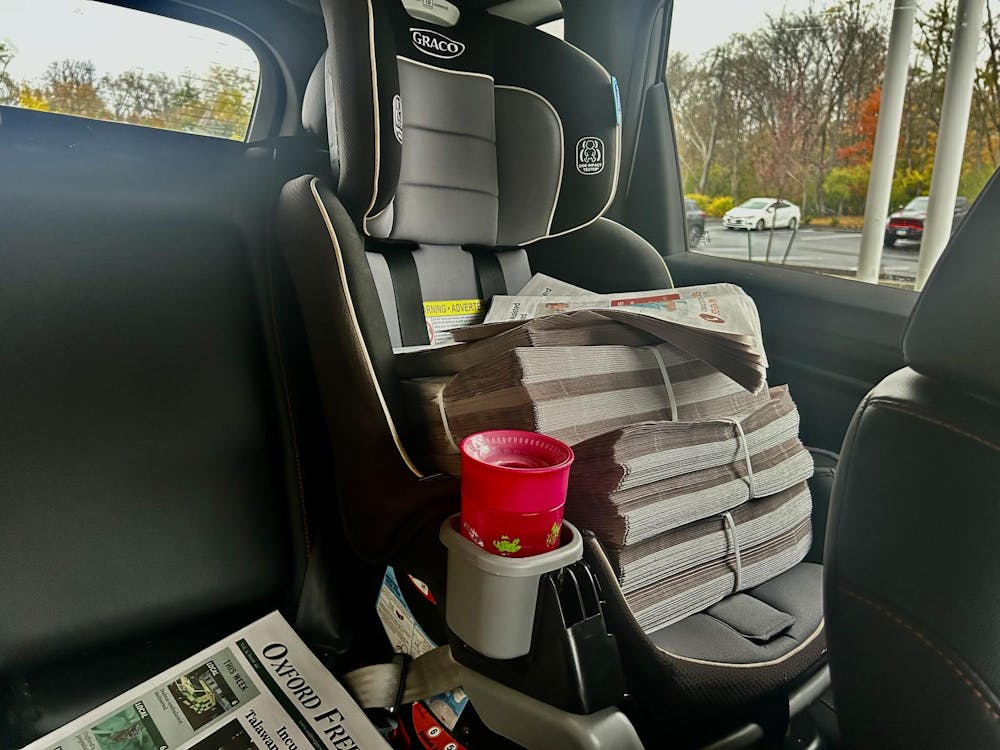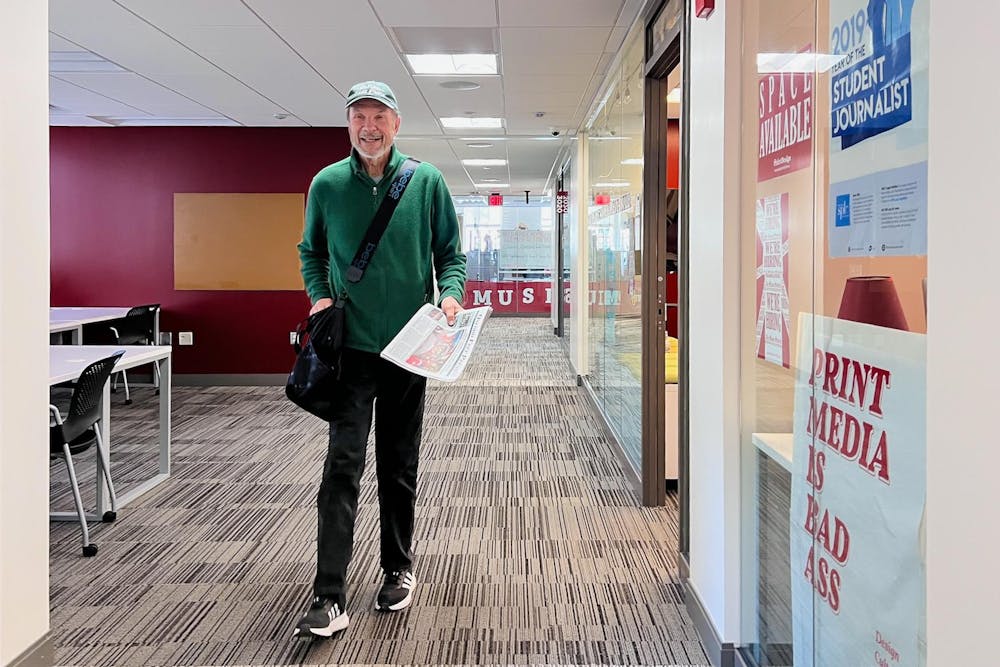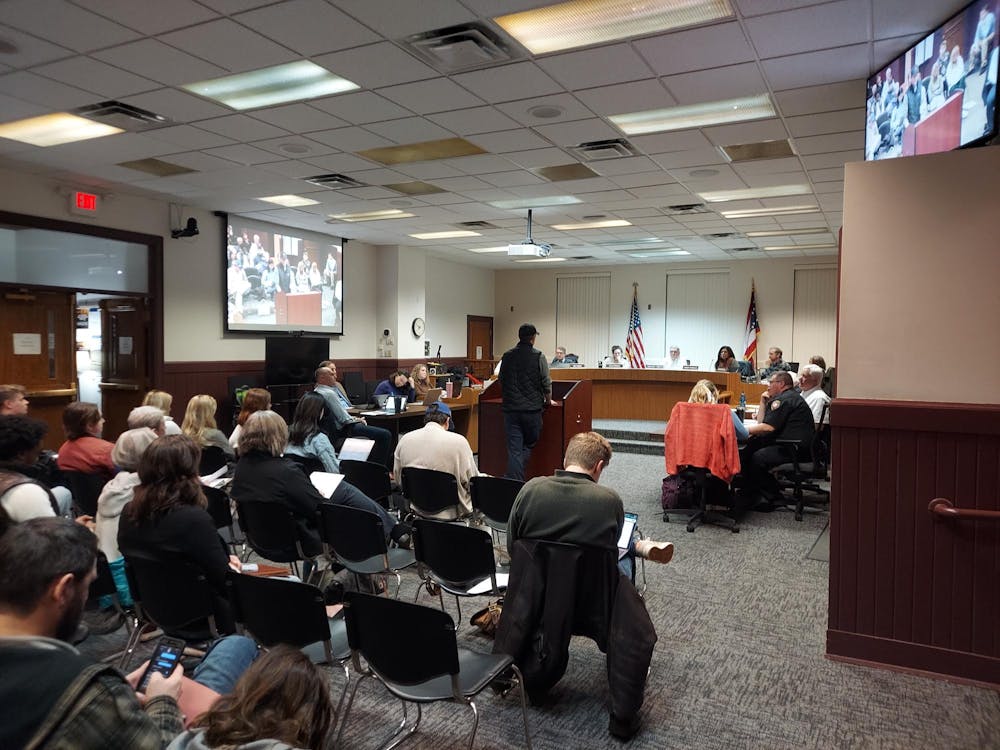It’s a Tuesday. 1961. A 12-year-old Richard Campbell leaves school and hops onto his bright red and white Huffy bike to deliver the Dayton Daily News in his hometown of Dayton. He earns enough to buy some pop and candy from delivering seven days a week.
“There were a couple houses with mean dogs,” Campbell said. “I would just throw [the paper] and take off.”
Now, at 76, he hops into his silver Honda CR-V hybrid to deliver the Oxford Free Press to his roughly 40 stops in Oxford every Friday morning – and he does this for free.
At each stop, Campbell gets out, reaches into the backseat where he stores about 300 copies of that week's edition in his three-year-old granddaughter’s car seat, and delivers them to businesses Uptown. The Animal Care Clinic, where he picks up his dog’s arthritis medicine, gets five copies. Salon Signature, where he gets his hair done, gets another five and the Starbucks up the street gets 15.
Later in the day, Campbell will visit Miami’s campus — a place he’s very familiar with after spending seven years working there as the founding chair of the Media, Journalism and Film Department and eight years before that running the journalism program.
“I've been a champion of local news ever since I've seen its decline and thought, ‘This is trouble when people don't have access to their own town's information and what's going on,’” Campbell said. “‘What are they doing for information?’ Well, they're not doing anything locally. They're watching cable news, they're listening to talk radio, they're on social media. They're getting a lot of bad information – they're not getting any reporting.”
Campbell also writes the Media Matters columns in the Oxford Free Press.
Enjoy what you're reading?
Signup for our newsletter

Campbell stores about 300 copies of that week's edition of the paper in his three-year-old granddaughter’s car seat, and delivers them to businesses Uptown.
Less than 25 years ago, the United States had about 40 journalists per 100,000 residents on average. Now, that number has dropped to 8.2 local journalists, a 75% decline according to Muck Rack.
More than 1,000 counties — one out of three — do not have the equivalent of one full-time local journalist. This creates gaps in coverage of businesses, what's happening in school districts, local government and the police station — leaving community members without a base level of knowledge.
Oxford is no exception.
John Skillings, a retired Miami University administrator and faculty member in math and statistics, said even though his background isn’t in journalism, he has always supported it. At Miami, he helped – along with Campbell and Jim Rubenstein, a professor emeritus of Geography at Miami – create the Oxford Observer, the journalism capstone class which operated for a little more than a decade. In this class, seniors could build their portfolios by writing for a professional publication.
In 2023, Miami stopped offering the Observer as the capstone, leaving a reporting gap in Oxford. Skillings said the trio decided they should do something more. That’s when they began to discuss creating a weekly print paper.
In January 2024, the Sunday print edition of the Journal-News in Hamilton cut the page it dedicated to Oxford. What started as a prosperous independent community newspaper a century ago eventually fell to a lone page in a neighboring publication. Its single-page termination left Oxford to rely on one college publication, but no professional one.
Later that year, the trio founded the Oxford Free Press.
“... I just wanted to be involved in getting news into the community,” Skillings said. “... We thought [The Free Press] might be, not only a way to provide information for the community to get out of this, so to speak, news desert, but it's also a way to bring people together. Another side benefit is to get more people involved in the activities.”
Similar to Campbell, Skillings delivered papers when he was 14, but stopped after two to three years once he saved up enough for his bicycle.
“[Campbell] will walk Uptown and say, ‘Well, let's drop off a few here, and drop off some there.’ He was Uptown the other day, and somebody had a sign out [that read], ‘You can get your Oxford Free Press here,’ so he thought, let me just give them some more copies,” Skillings said. “He's our number one delivery person.”
Sean Scott, the first editor of the Oxford Free Press and a Miami alumnus, is now the religion, politics and society reporter for the Maine Monitor.
He said if local outlets aren't covering local decisions, like the Oxford City Council meetings every other week, those aspects just aren't going to be covered.
“They do impact people's lives,” Scott said. “They impact the businesses that come to Oxford, and I think that having a local paper that is explicitly focused only on those local issues is really important.”
At roughly 1 p.m. every Friday, Campbell can be found making his way onto Miami’s campus.
His route includes all of the deans’ offices and roughly 10 education buildings.
Campbell isn’t the only volunteer. He said the Oxford Free Press has 15 people helping out every week, delivering to the different shops Uptown and to the neighboring townships. All of them are also retirees.
Campbell said he would guess they drop off to a total of 50 to 60 locations.
“Richard cares very, very deeply about the paper and loves getting it to people,” Scott said. “So I feel like every week or every month or so, he would come in and talk about this new place that he was dropping off on campus. He was also very passionate about making sure Miami people were up to date on it … He loves local journalism and is a very good person to have on the team.”
Taylor Stumbaugh interned for the Oxford Free Press in the summer of 2024.




